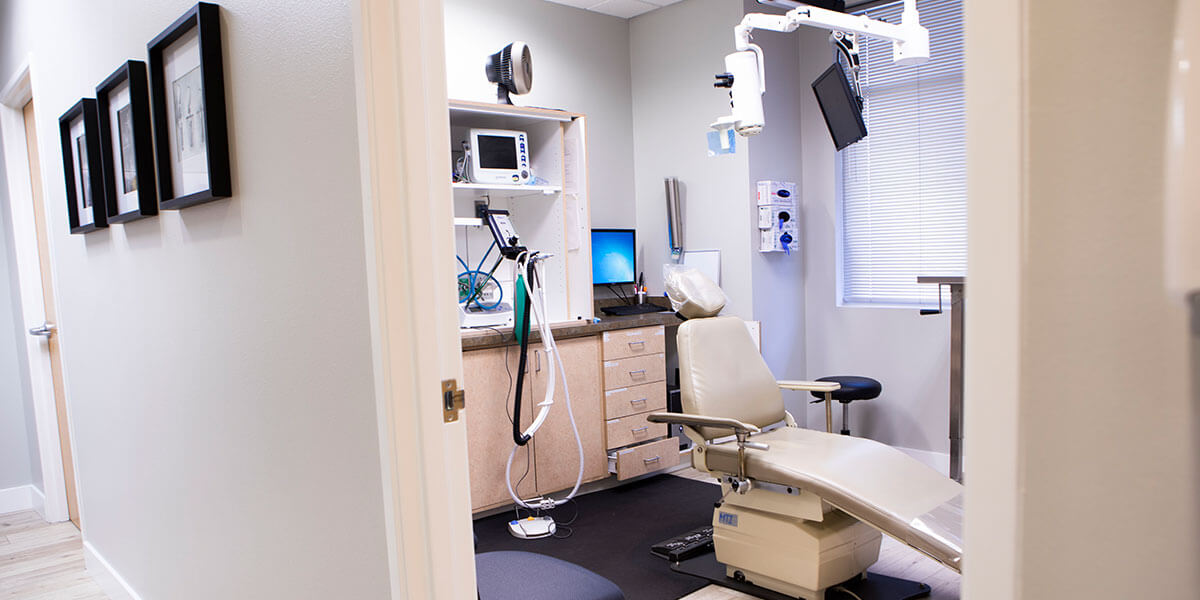Dental Anesthesia in Albuquerque, NM

Rio Grande Oral Surgery & Dental Implant Center provides dental anesthesia services in Albuquerque, NM. Call 505-821-2111.
At Rio Grande Oral Surgery & Dental Implant Center, our patients’ safety and comfort are our top priorities during surgery. We understand that undergoing any surgical procedure can make patients anxious or nervous, and we do our best to put our patients at ease. We have extensive training and experience in anesthesia administration, allowing us to deliver a safe and comfortable experience. Patients aged six and above can generally receive anesthesia in our office, while those aged five and below receive IV sedation or general anesthesia in a hospital operating room.
Types of Anesthesia
We provide local anesthesia for all procedures, using a combination of topical and injected medications to thoroughly numb the surgical site. You will be awake and aware throughout your surgery, and you can drive yourself home afterward. Local anesthesia can take a couple of hours to wear off following your procedure, so take care not to bite your lips, cheeks, or tongue. Also avoid hot or cold foods or beverages until the anesthesia wears off, as you will not be able to determine safe temperatures.
Nitrous oxide, or “laughing gas,” is a mild sedation option for those who just need to take the edge off. You will inhale a carefully calibrated blend of nitrogen and oxygen through a mask over your nose. You will remain awake and responsive, but will feel deeply relaxed, heavy, and a bit giddy or silly. Nitrous oxide wears off in minutes after the mask is removed, allowing you to safely drive home. It is a great choice for those who fear being out of control, as you can always remove the mask during the procedure if you start to feel uncomfortable.
IV sedation is an extremely common option for oral surgery. You will enter a “twilight sleep” state, in which you can respond to our instructions during surgery, but you will remember little or nothing of your procedure afterward. You should not eat for eight hours before undergoing IV sedation, and you must bring someone to your appointment to drive you home. Do not drive or operate machinery for 24 hours after your procedure.
General anesthesia is typically administered only for serious, hospital-based procedures such as corrective jaw surgery. Do not eat or drink anything for eight hours before surgery. You will be unconscious for the procedure and then given time to wake up in a recovery room. Bring someone with you to drive you home and stay with you throughout the night. Do not drive or operate machinery for at least 24 hours, or longer if you still feel groggy.
Dental anesthesia allows us to provide our patients with the most relaxed and comfortable experience possible. We will go through your options with you before the day of your procedure and help you choose the one that is right for you.
Are you looking for an oral surgeon in Albuquerque, NM? Call Rio Grande Oral Surgery & Dental Implant Center today at 505-821-2111 to schedule your first appointment.
Frequently Asked Questions About Anesthesia
Should I be put to sleep for tooth extraction?
The answer to this question comes down to your personal preferences. If an extraction is simple, you may wish to have it performed using only local anesthetic to numb the site, or local anesthetic with mild sedation to help you feel calm. Patients who have impacted teeth often choose IV sedation, which puts them in a semi-conscious state so they feel as if they’re sleeping.
How does general anesthesia work for oral surgery?
General anesthesia for oral surgery is offered only for complicated procedures in a hospital setting or surgical center. We will help you understand what to expect during your consultation.
Will I feel any pain with dental sedation?
Dental sedation helps you relax during a procedure, but it doesn’t keep you from feeling pain. This is why sedation is paired with local anesthetic, which numbs the area where we’re working.
Does nitrous oxide put you to sleep?
No, nitrous oxide will help you relax during your procedure, but it will not put you to sleep. You’ll be awake, aware, and able to communicate.
Is IV sedation safer than general anesthesia?
IV sedation and general anesthesia are both safe when administered properly. There are more risks with general anesthesia, which is why it is administered only in a hospital setting.
